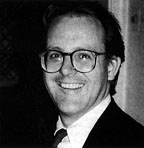

No kidding. Within the last fifteen months, Mulholland's enterprise, Mecklermedia Corporation, the self-proclaimed "Internet Media Corporation," has earned $20.5 million with public stock sales, yielding a market capitalization (an estimate of a company's worth) of $170 million on the NASDAQ.
"The growth of the company is astronomical. It certainly parallels the growth of the Internet," he says of the global commercial infrastructure that boasts 38 million users worldwide, up from 22 million in 1993.
Mulholland draws further parallels between gold and the dazzling performance of his company. "It's reminiscent of the California gold rush days. The fellows digging for gold weren't necessarily the ones who made the money. The guys selling the blue jeans, the pick axes, the whiskey -- the fundamentals -- they got rich. We're sellers of information," he concludes, "providing the fundamental approach to the Internet."
Established in 1971 as a publisher of historical journals, tomes, and dictionaries, Mecklermedia changed direction just three years ago when founder Alan Meckler envisioned the expansion of technology and sought outside investors. Enter Jim Mulholland with a master's in business publishing from New York University. Since 1992, the operation has specialized in the Internet, and, to a lesser extent, virtual reality, with a three-pronged approach: magazine and book publishing, on-line services, and trade shows.
Although CD-ROMs were an initial focus of the company's business, that emphasis quickly changed." Anything you get on CD-ROMs you can get on the Internet," says Mulholland. "Two years ago I would have told you how great CD-ROMs were. Now, I'd say they're passé, gone the way of the dodo bird.".
Yes, CD-ROMs are history, according to this Bates history major. Mulholland shares an abiding passion for the discipline with Meckler, who received a doctorate in history from Columbia University, but estimates that since meeting, the two have spent no more than five minutes discussing their common ground.
More likely, they spend time charting the future for the shining star of Mecklermedia's print stable, Internet World Magazine, a commercially sold glossy with a paid subscription of 200,000 and the only publication on the market devoted solely to the Internet. The corporation also publishes Web Week, a controlled tabloid aimed at World Wide Web professionals, and Web Developer, a tech journal for Web developers.
The big money makers, the "cash cows," as Mulholland refers to them, are the trade shows, particularly the spring and fall Internet World, held alternately on the East and West coasts. Last spring's show in San Jose featured 40,000 square feet of exhibition space and drew 27,000 participants. Fall Internet World, planned for Boston in late October, expects to exceed 60,000 square feet.
Despite the company's meteoric ascent, Mulholland keeps in mind the need to remain fiercely competitive. A Rhode Island high-school track champion in the 400-meter event, Mulholland won almost all his races as a Bates Bobcat. A 1982 newspaper photograph shows him leaning into the finish-line tape with a grimaced expression to edge out his University of Lowell competitor for a .02-second victory in the 500-meter run. There is no mistaking his intensity.
"I like to be competitive," says Mulholland, whose father, James S. Mulholland, Jr., founded a software publishing company, planting the seed for his son's future interest. "We're a very small business, and even though we have a market cap of $175 million, it's peanuts compared to the big boys -- the Time-Warners, the Ziff-Davises. You have to be mean and lean."
They are. According to Mulholland, although they've grown from twenty-one to eighty employees in two years, they'd now employ more had they followed a more traditional path. "But we have no secretaries, no assistants," he says. "If you can't answer your own phone, too damn bad!" Besides a low overhead, self-sufficiency among employees encourages equality in the workplace, a democratic emphasis of the computer age, according to Mulholland.
What makes a relatively small operation so successful? Aside from the staff's talent and vast knowledge, Mulholland points to the company's early entry onto the playing field. "It's name-brand recognition. The first to come out is the one to last."
Yet Mulholland is as likely to cruise home for lunch with his family as he is to cruise the Web. He and his wife, Susan Kempton Mulholland '84, have three children: James IV (5), Hilary (3) and Rosemary (1). Unlike many other hectically scheduled executives, Mulholland lives a mere ten-minute drive from his office. "It allows me to come in early, to leave late, to take my son to an afternoon swim class. It's a real treat," he says.
Despite his success, Mulholland still pinches himself on a regular basis. "I have to go home to my wife and say every day, 'Can you believe where we've gone in two years?' Twenty-four months ago, someone might have said to me, 'The Internet, what's that?'" he says somewhat incredulously.
Now we all know.
By Phyllis Graber Jensen